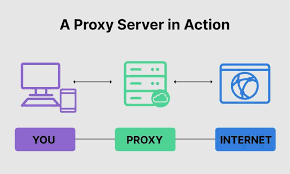It is likely that the average person knows little about how proxy servers function.
Many people believe proxy servers enable them to unblock Netflix content from other countries or to stay more secure on open WiFi networks. Proxies do a lot more than that, however, and are particularly vital for businesses.
Proxy servers are useful for connecting private computers to public servers on the Internet.
Instead of sharing an IP address, a proxy server makes its own public. Even though the proxy IP address seems rather insignificant, it can be utilized for a variety of business functions, from customer service to security.
Reasons to Use Proxies for Business in 2025

Even if you aren’t involved in the technology side of things, there are five essential reasons for business leaders to use proxy servers.
1. Improve Corporate and Institutional Security
Companies are concerned about hackers today. Both monetary losses and a damaged reputation can be associated with data breaches.
There is less chance of a breach when a proxy server is used. Your servers are more secure when connected via proxy servers. proxy servers act as a buffer by facing the internet and relaying requests from outside the network.
You might not be able to prevent hackers from accessing your proxy, but you might be able to prevent them from accessing the server actually handling your data. Even if you can’t completely block top hackers with just a proxy IP alone, you’ll be much less vulnerable.
2. Carry Out Sensitive Tasks Anonymously

Anonymity is one of the main benefits of proxies. The importance of this function for businesses is often underestimated, unfortunately.
By utilizing proxy servers, reporters, whistleblowers, security officers, and clients, and partners are protected from identifying information leaks and fraudulent activity.
By protecting any ongoing research and development, you can also improve the effectiveness of the company.
Your company uses a proxy so that potential spies trying to spy on your employees will be unable to track them as easily. Any sensitive task performed over the internet should be anonymized first with a proxy server.
3. Balance Traffic So Your Server Doesn’t Crash
There is nothing more annoying than having a company’s website go down when you need it. Proxy servers, cloud storage, and peering provide better customer service by preventing these issues.
It is essentially the same thing, except the content and data on your site is stored on many remote servers across the globe, and peering helps your network handle more traffic. It isn’t reasonable to require customers to test multiple ISPs in order to access the content.
To create an access point, a proxy server is used instead.
Through the proxy, each server’s requests are balanced so none is overloaded. These functions all work behind the scenes to make sure your customers have a seamless experience.
4. Control Employee Internet Usage
Companies do not want employees to access insecure websites. Proxy servers are often used to secure internal networks.
The network administrator controls which devices can access a network through a proxy and which sites those devices can access through a proxy. Your employees can be blocked from viewing unwanted content or accessing any websites you do not want them to access while working.
It is even possible for network administrators to record content access logs for internal use. The data can be used to identify possible security breaches or illegal activities.
5. Faster Speeds and Bandwidth Savings
People assume proxy servers slow down internet speeds since they perform extra work in the background.
Sometimes that’s not the case.
With proxy servers, you can improve performance and save bandwidth on a network by compression, caching, and stripping out advertisements from websites. Your team will be able to access the internet quickly and easily since wasted bandwidth is freed up.
Also read: Squid Proxies Coupons


